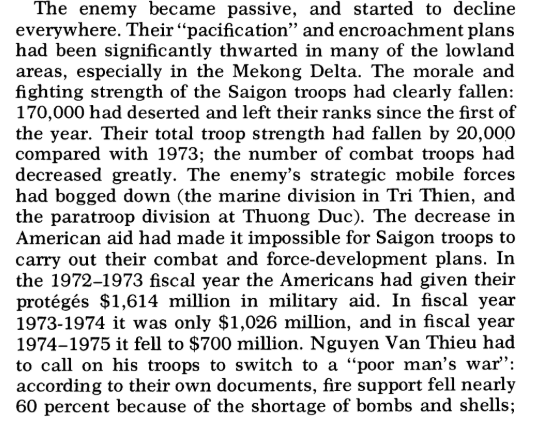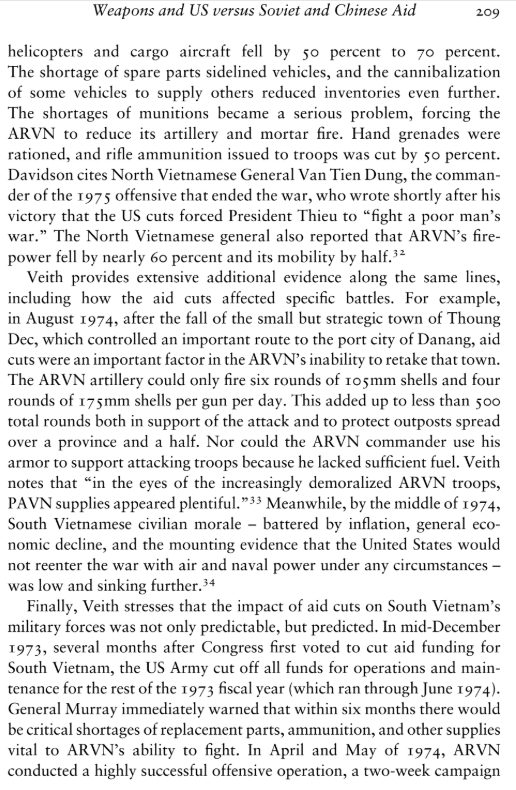Post by EwellHolmes on Apr 14, 2020 18:45:08 GMT
No it would stop a quick defeat for the RVN but that will remain vulnerable until its got a much stronger basis and/or the threat from the north [and west] is removed, which is much more difficult. It will take a lot of time and effort and there will be a need for troops on the ground for a few years yet.
What might make the difference is that 2012 troops with experience from the ME and other areas are likely to be much more aware of the need for an hearts and minds approach rather than the sheer firepower that often got used in the 60's in Vietnam.
If the US can prevent the Khmer Rouge gaining power that would be a huge boost for that country, although few in 1972 will be aware of it. Also if they can restore some stability to Cambodia that would help safeguard the western flank of S Vietnam. However again their already in a weak position there.
Steve
The threat of insurgents had ceased to exist with the failure of the Tet Offensive:
The offensive was undertaken in the hope of triggering a general uprising, but urban Vietnamese did not respond as the Việt Cộng anticipated. About 75,000 communist soldiers were killed or wounded, according to Trần Văn Trà, commander of the "B-2" district, which consisted of southern South Vietnam.[63] "We did not base ourselves on scientific calculation or a careful weighing of all factors, but...on an illusion based on our subjective desires", Trà concluded.[64] Earle G. Wheeler, chairman of the Joint Chiefs of Staff, estimated that Tet resulted in 40,000 communist dead[65] (compared to about 10,600 U.S. and South Vietnamese dead). "It is a major irony of the Vietnam War that our propaganda transformed this debacle into a brilliant victory. The truth was that Tet cost us half our forces. Our losses were so immense that we were unable to replace them with new recruits", said PRG Justice Minister Trương Như Tảng.[65] Tet had a profound psychological impact because South Vietnamese cities were otherwise safe areas during the war.[66] U.S. President Lyndon Johnson and Westmoreland argued that panicky news coverage gave the public the unfair perception that America had been defeated.[67]
Aside from some districts in the Mekong Delta, the Việt Cộng failed to create a governing apparatus in South Vietnam following Tet, according to an assessment of captured documents by the U.S. CIA.[68] The breakup of larger Việt Cộng units increased the effectiveness of the CIA's Phoenix Program (1967–72), which targeted individual leaders, as well as the Chiêu Hồi Program, which encouraged defections. By the end of 1969, there was little communist-held territory, or "liberated zones", in South Vietnam, according to the official communist military history.[69] There were no predominantly southern units left and 70 percent of communist troops in the South were northerners.[70]
Aside from some districts in the Mekong Delta, the Việt Cộng failed to create a governing apparatus in South Vietnam following Tet, according to an assessment of captured documents by the U.S. CIA.[68] The breakup of larger Việt Cộng units increased the effectiveness of the CIA's Phoenix Program (1967–72), which targeted individual leaders, as well as the Chiêu Hồi Program, which encouraged defections. By the end of 1969, there was little communist-held territory, or "liberated zones", in South Vietnam, according to the official communist military history.[69] There were no predominantly southern units left and 70 percent of communist troops in the South were northerners.[70]
The ARVN could and also did, as evidenced by the 1972 Easter Offensive, stand on its own against both the reduced VC and the NVA itself at large, which was the ultimate instrument of Communist victory in 1975. This was because, as a result of Watergate, the U.S. Congress pulled air support and logistical funding to the ARVN. To quote from the NVA commander himself, who captured Saigon in April of 1975:

This is shared by U.S. sources:





